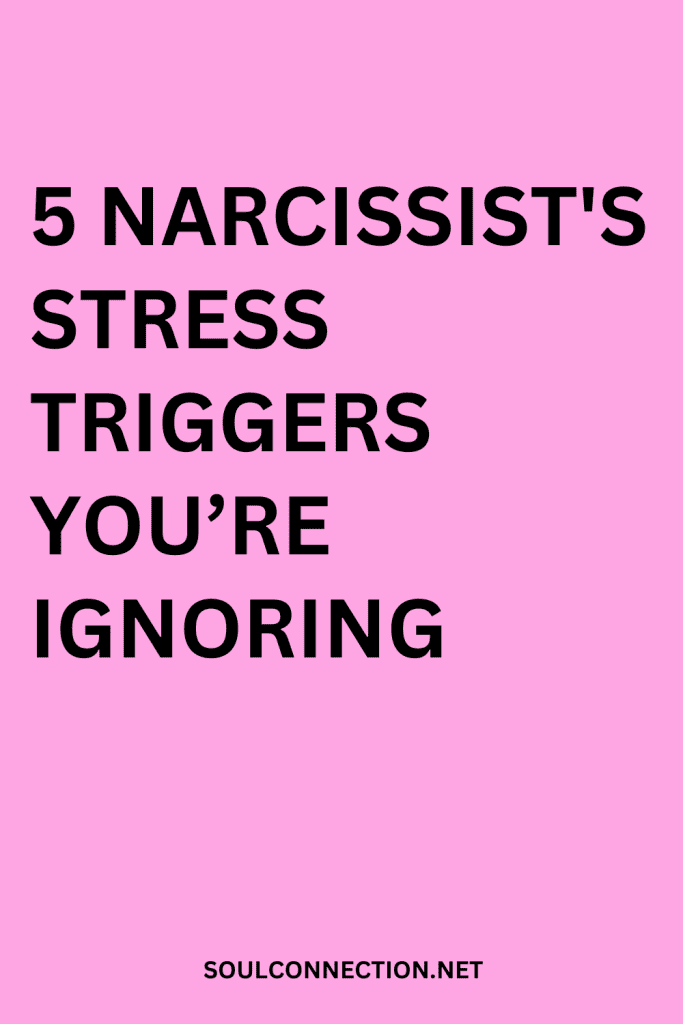Narcissists: the people who can make a three-minute story about their lunch feel like a Ted Talk.
If you’ve ever tangled with one (or, bless your patience, still do), you know the rules of the game keep changing—and the scoreboard is always, miraculously, in their favor.
While most relationship guides obsess over identifying narcissists, precious few actually explain what sets them off.
Today, we’re flipping the script and shining a (slightly sarcastic) spotlight on the stress triggers that send narcissists spinning. Because, let’s face it, forewarned is forearmed—and also, sometimes, just funnier.
1. Criticism (Even the Teeny-Tiniest Kind)
Mention a flaw to a narcissist and watch their face do that thing—somewhere between a soap opera gasp and a sneeze caught midair. The idea that they might be less than perfect? It’s not a paper cut; it’s an existential crisis.
Compliment their new haircut, but say you liked the old one too, and suddenly you’re auditioning for Lead Villain in the Drama of Their Life.
This isn’t just garden-variety defensiveness. The narcissist’s self-esteem is a precarious Jenga tower of external validation. Pull out one little block—say, “Maybe next time, try not to be late”—and the entire structure wobbles.
Cue the storm: angry outbursts, victim monologues, or those icy silences that could freeze a lava lamp.
So, what do you do when you have actual feedback (because, newsflash, you’re a normal human who occasionally gets annoyed)? The secret is padding, and lots of it.
Wrap your point in enough compliments to make a sandwich, and throw in a “you’re so talented” for good measure. It won’t always work, but at least you won’t get caught in a monsoon of wounded pride.
2. Boundaries (Yes, They’re Still a Thing)
Try telling a narcissist “no” and see what happens. Spoiler: it’s not gratitude for your healthy limits.
Boundaries are kryptonite to those who thrive on control. Say you don’t want to discuss your work drama at 2 a.m., or you’d rather not lend them your car, or maybe you just want half an hour to yourself—suddenly, you’re being “selfish.” The horror.
Here’s the kicker: narcissists often interpret boundaries as personal rejections. To them, your “me time” isn’t about your sanity; it’s a direct attack on their importance.
Cue the guilt-tripping, sulking, or impressive Oscar-worthy performances about how you’re “pulling away.”
Tired of being the emotional concierge? Set boundaries anyway. Offer clear, calm explanations—then stick to your guns with the confidence of a bouncer at a sold-out gig.
Yes, there will be pouting. Yes, you’ll be accused of being “cold.” But you’ll also get precious real estate back in your own brain.
3. Being Ignored (Or Not Being the Main Character)
If a narcissist falls in the forest and nobody’s there to witness their monologue, did it even happen?
Attention is the oxygen in a narcissist’s balloon. Take it away—say, by talking to someone else at a party, or worse, focusing on your phone (how dare you?)—and watch them wither, sulk, or go on the offensive.
Suddenly, the person who “hates drama” is stirring it, usually by creating a crisis or telling a story so wild it demands to be heard.
Don’t be surprised if, after you’ve had a long chat with a friend, the narcissist suddenly “remembers” a personal tragedy or an urgent need for your attention.
This isn’t a coincidence; it’s camouflage for their panic at not being the main event.
If you’re craving balance, try sharing attention evenly and calling out attempts to hijack the spotlight—gently, of course.
“Babe, can we let Mark finish his story?” might not win you applause, but it sets a tone that says: other people exist, and sometimes, they get a turn.
4. Loss of Control (a.k.a. The Universe Isn’t Revolving Around Them)
Control isn’t a want for narcissists; it’s a need. Give up the remote control, let you pick the restaurant, or—heaven forbid—make plans without them, and the stress level goes to DEFCON 1.
It’s not about the sushi place vs. the burger joint—it’s about who’s wielding the metaphorical scepter. When narcissists can’t script the conversation or dictate the schedule, they feel exposed.
Their carefully curated world starts to fray, and they’ll yank it back into line with bossy demands, manipulation, or even sabotage. “Oh, we’re seeing your friends again? I suddenly have a headache…” Sound familiar?
Regaining your sense of autonomy can feel like smuggling snacks into a cinema—possible, but fraught with peril. Still, it’s worth the risk.
Suggest shared decisions, rotate choices, or simply declare: “Tonight, I’m picking. Next time, you get to.” The goal isn’t total mutiny, but a little revolution now and then can keep the peace—at least until the next episode.
5. Genuine Intimacy (Not the Instagram Kind)
Narcissists love attention, but ask them to open up emotionally? Suddenly, they’re busier than a barista during the morning rush.
Real vulnerability threatens the façade—peek behind the curtain, and you might see the scared kid who built all those walls.
Moments that call for empathy, humility, or accountability send narcissists scrambling. An honest apology? Acknowledging that your feelings matter?
These are the stress tests that expose the wobbly foundation underneath all that bravado.
Try having a real conversation about your needs, and you might get deflection, jokes, or a change of subject so abrupt it could give you whiplash.
Sometimes, they’ll offer a textbook apology (“I’m sorry you feel that way”), which is about as comforting as a soggy biscuit.
Still, intimacy matters. If you’re craving real connection, invite small moments of honesty. “I’d love to know what you’re feeling about this” can open a door, even if only a crack.
Celebrate progress, not perfection—and remind yourself that deep emotional work won’t happen overnight, especially if it’s never happened before.
When Narcissist Stress Triggers Run the Show
Living—or loving—alongside a narcissist can feel like starring in a play where the script is rewritten every night. Their stress triggers shape the plot, set the mood, and sometimes, dictate who gets to speak.
Recognizing those triggers isn’t just about avoiding landmines; it’s about reclaiming your right to your own feelings, boundaries, and sanity.
The next time you spot a narcissist’s stress flare-up, take a step back. Breathe.
Remember that their reaction says more about their own insecurities than it does about your worth.
Most importantly, keep your sense of humor handy.
After all, if you can’t laugh at the absurdity of someone launching into a soliloquy about your “selfishness” because you wanted the last slice of pizza, what can you do? Plenty. Including, perhaps, saving the last slice for yourself.


